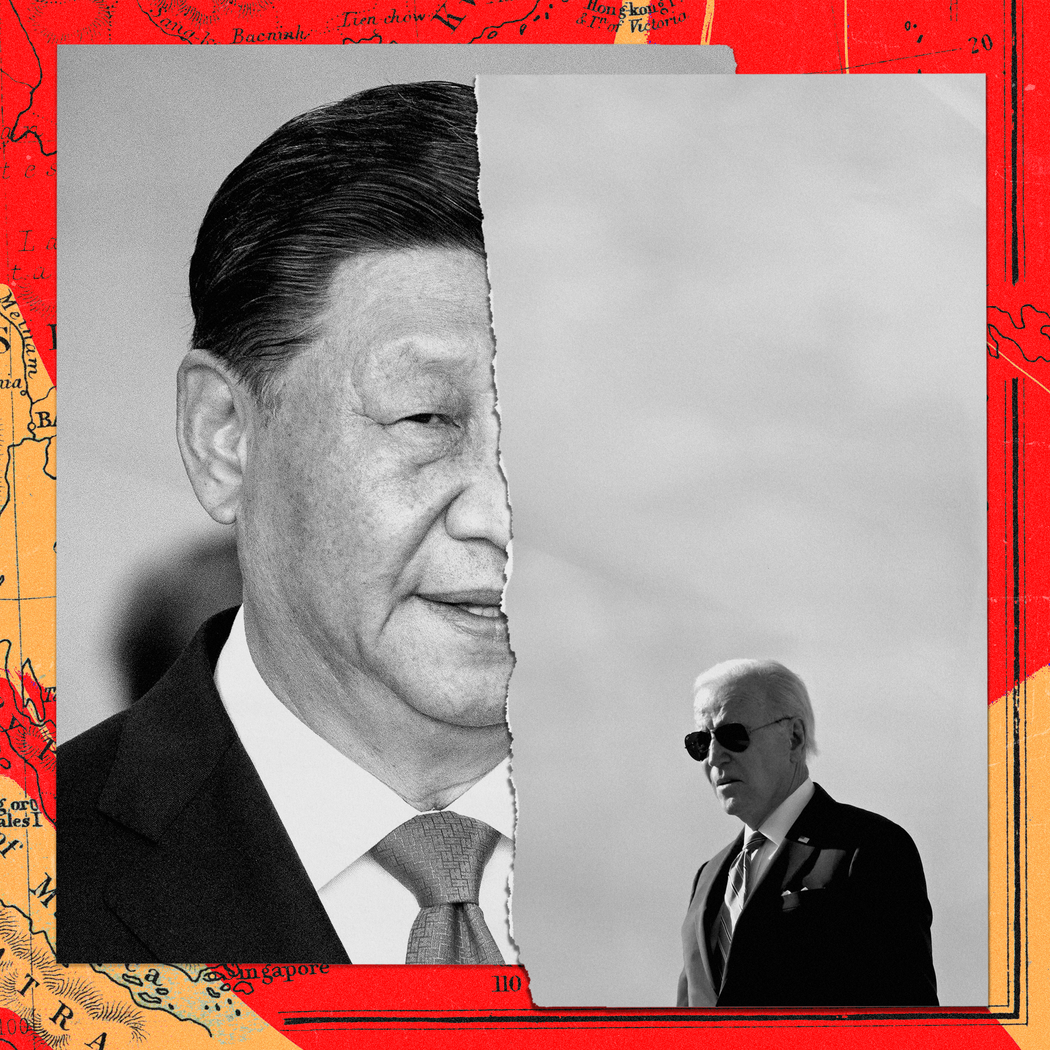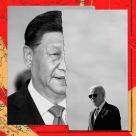
Earlier this month, a Chinese spy balloon was discovered and shot down in the United States. US Secretary of State Anthony Brincken subsequently decided to postpone the first China trip to the highest diplomat in the United States since 2018. This has become the relationship between the two major powers.The latest chapter in the long story of deterioration.
The real start of this story was five years ago. At that time, the Trump administration launched a continuous trade war in Biden.In May this year, President Biden promised that if China launch an attack on Taiwan, the United States will defend Taiwan.The interview highlights this.Last month, a senior general of the US Air Force released a memorandum of memo, predicting that the war broke out in 2025, and called for preparations to "deter China and defeat China when necessary."
Why does Washington think that China is the biggest threat to US national security?Is these concerns basis?In order to prevent two potential catastrophic military conflicts between two countries with nuclear weapons, what should be done?The following is people's views.
How dangerous is China?
China's authoritarian government has given their citizens with little citizenship, as well as less political rights, and passed the endless one -party rule, a wide range of review systems, suppression of civic society, and the leadership of President Xi Jinping.Complex surveillance and publicity systems, as well as large -scale religious people and ethnic minorities that have been characterized by the United States as racial extinction to exercise their control.
Of course, there are other authoritarian governments in the world; the United States has even an alliance with some of them.However, for U.S. officials, in addition to its scale, the reason why China has become a unique threat is its military modernization and the use of US Minister of Defense Lawde Austen, China "to adapt to its authoritarian preferencesAnd reshaping the increasingly high -voltage actions adopted by the India -Pacific region and the international system. "
#8226; In recent years, Beijing has put forward extensive sovereign requirements for South China Sea, one of the most important waterways in the world, which are generally regarded as illegal.
#8226; it actually deprives Hong Kong's autonomy and suppresss Hong Kong's democratic movement.
#8226; China also held more radical military exercises near Taiwan.Taiwan is a prosperous democracy established in 1949. It is only 160 kilometers from the coast of mainland China. Beijing believes that Taiwan is an illegal separation province.
Since the 1970s, the United States has reached a subtle diplomatic balance through the "one China" and "strategic fuzzy" policy. The former does not recognize Taiwan as a sovereign country.EssenceTaiwan leads the production of micro -chip that is vital to electronic equipment functions.U.S. Minister of Commerce Gina Raymond Doro warned last year that if China's invasion limits the supply of these chips, it will lead to "serious and direct recession" and "we cannot protect ourselves."
As the world's second largest economy, China also impacts through trade, intellectual property theft and investment in developing countries. Critics say the latter is a new form of colonialism.With the growth of the Chinese market forces, "American institutions and companies are becoming more and more silent to avoid irritating the Chinese government," Jehmann Lopez, which reports.
However, despite these concerns, many people still refuse to accept that China has a threat to the United States for survival.At the most basic level, "China has neither destroying the United States' destructive ability nor destroying the geopolitical motivation of the United States," Pei Minxin, a professor of government professor of Clemont Makina College, published an article in Bloomberg in 2021.He also said that even if it has recently expanded, China's nuclear arsenal is still much smaller than the United States, and the Chinese army is still behind in terms of technological advancedness and experience.
According to Michael Swaine, a senior researcher at the Institute of Institute of Quinxi, the Chinese government has no interest in the export of its governance system.He published an article in his foreign policy in 2021: "Even if there is, it is almost completely targeted at developing countries, rather than industrial democratic countries like the United States." In addition, China's economic development model "It is almost unsustainable. This is the fact that China's population aging, extensive corruption, severe income inequality, and imperfect social security networks, and the fact that it is free to flow information for global innovation. "
From the perspective of Jessica Chen Weiss, a professor of research professor in China and Asia -Pacific University, the logic of starting with China with China has become so common among the two parties in Washington, so that it may damage the United States itselfInterests.Last year, she wrote in the magazine of foreign affairs: "If individuals feel that in order to protect herself and career development, it is necessary to show stronger performance than others, and they will have group thinking."
For critics of this group thinking, response to balloon events is another example of threatening expansion."Americans use various technologies to collect information from China and other countries: satellites, telephone eavesdropping, computer invasion, and even old -fashioned human resources," written by foreign policy columnist Emma Ashford."It seems that Washington has done the whole thing too much."
Can the United States and China compete without conflict?
Even those who use the rise of China as the country's primary task are not particularly keen to launch wars, because this will almost definitely pay a huge price:
#8226;#160; According to the recent simulation of the Strategy and International Research Center, in the conflict caused by invading Taiwan, the United States and its allies will lose tens of thousands of soldiers, and the Taiwan economy will also be severely damaged.
#8226;#160; Rand Company's research shows that to a certain extent, because the US and Chinese economies are highly dependent on each other, a war that lasts a year will lead to a decrease of US GDP by 5%to 10%.China's GDP dropped by 25%to 30%, which has a serious impact on the global economy.
#8226; conflict may also endanger the cooperation between climate change between the two world's largest greenhouse gas emissions countries in the United States and China, as Peross's visit to Taiwan temporarily.
How to avoid war is the best, people have different opinions.On the issue of Taiwan, Chen Yujie, a professor of research in Taiwan, believes that deterrent China needs like -minded democratic countries to show more support, "including signing bilateral economic agreements with Taiwan to allow Taiwan to join the regional trade organization to reduce Taiwan's economy in terms of economic pairing.Excessive dependence of mainland China, support Taiwan's participation in international organizations, and more attitude like Pelosi visit.Essence
But some people think that this is a provocation and will be counterproductive, because Beijing has assumed that the United States will support Taiwan in the conflict."This implies that our policy is to ensure that Taiwan is independent, so that it will weaken mutual trust," Arthur Kroeber, the founding partner of the China Research Company Longzhou Economic News, told diplomatic affairs last November."It may incite Taiwan to take more radical actions to move towards independence, which will increase rather than reduce the possibility of armed conflicts."
On other issues, people have more consensus on how to alleviate tensions.For example, the increase in military assistance to democratic countries in the region has been relatively widely supported."Focusing on the active rejection strategy of providing defensive weapons to the United States allies, and deploying the power of the United States in low -key and more flexible in the region, it will increase the cost of Chinese military operations without exacerbating China's own anxiety.Full sense, "Chinese historian Jake Werner and Senior Researcher William Hardon, a senior researcher at the Institute of Quinxi Institute.
Last year, Congress passed the two -party legislation and launched a 52 billion US dollar subsidy and tax credit to encourage domestic chip production. This industrial policy can help reduce the impact of Taiwan's dispute on national security by hedging weak supply chain.Just as Steven Ratner, a consultant of the Obama government's financial minister, wrote at the Times last month, "even many free market conservatives seem to realize that unrestrained capitalism will lead to imperfect results."
Bynden can also reduce the temperature of the US -China competition by reducing tariffs on imported goods in China. The editorial committee of the New York Times described the tariff last year as "the Trump administration's strategy of failing China to make economic concessions."The editorial board believes that the United States should not try to change China, but should focus on strengthening relations with neighboring Chinese countries, because "the recent history tells us that the United States can more effectively promote and defend its own interests when unilateral operations do not act in unilateral operations."
At present is the restless peace
No matter how to calm down the balloon incident, this highlights how nervous the US -China relations have become, how easy it is to evolve into a conflict in the next dispute."As we saw in the balloon incident -Does anyone foresee that there will be such an air -enabling crisis? -The possibilities of possibilities," reported that China ’s Chris Buckely said this week.
It also revealed how lack of communication between the two big powers: shortly after the balloon was shot down, the Pentagon stated that the Minister of Defense Austin contacted the Chinese National Defense Minister through a special crisis hotline, and the latter refused to answer his call.
If this cold atmosphere continues, "When the time of the fate of the world is coming, a new Cuban missile crisis is not unimaginable," Michael Schumanman wrote in the Atlantic Ocean."Then these two opponents may find that the communication channels they need to avoid disasters cannot work. Their hostile attitude is too deep and cannot find a solution."
Spencer Bokat-Lindell is the editor of the Times Perspective.Welcome to go to Twitter to go to him: @Bokatlindell.
Translation: New York Times Chinese website




